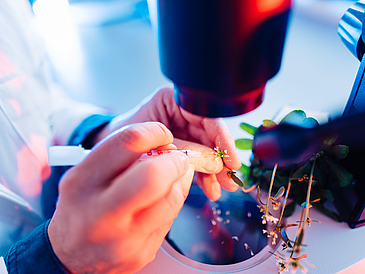The aim is to use three-parent crosses in plants to establish a new breeding strategy for agriculture. In times of climate change, the project can make an important contribution to solving the challenges of the future.
Specifically, it involves funding granted by the EU’s European Innovation Council (EIC). It is aimed at basic researchers from universities and research institutions as well as companies. With the EIC, the European Commission is pursuing the goal of developing visionary, radically new, high-risk ideas of all types with potential for sustainable change and bringing them to market. “With our partners, Aardevo and KWS, we would like to implement the three-parent hybridization technology in order to cross agricultural plants with more climate-resilient wild plants,” explains Professor Rita Groß-Hardt. The focus is being placed on potatoes and sugarbeet. “Here in Bremen, we will additionally work on technologies within the project that can increase the efficiency in creating and detecting three-parent plants,” states the biologist.
“The EU funding from the EIC Transition initiative underscores the competence that our researchers have in bringing basic research into innovations,” says the University of Bremen President, Professor Bernd Scholz-Reiter. “I am very pleased that this has been achieved with this outstanding project and congratulate Ms. Groß-Hardt and her project partners on this significant step.” The consortium has been granted a total of 2.5 million euros, of which roughly 1.6 million euros will go to the University of Bremen as the project coordinator.
What Is It All About Exactly?
In 2017, Rita Groß-Hardt and her team succeeded for the first time in generating plants with three parents - a mother and two fathers - using a novel method. These groundbreaking research findings may now lead to a new breeding strategy. “With the help of three-parent hybridization, the positive traits of three plants can be combined at once in a single step. Additionally, this novel breeding strategy can bypass hybridization barriers, which in turn opens the door to distantly related species being combined,” states Rita Groß-Hardt. Conventional plant breeding can be further supported by new technologies in order to respond even faster to the changes caused by climate change.
“It would not have been possible to develop our technology without the support of the European Research Council, a great team, the University of Bremen, and, most importantly, strong partners like KWS and Aardevo, who, together with the EIC, are now making it possible for us to elevate the technology to a new level.”
Filed for Patent
The “Three-Parent-Hybridization” procedure, which was developed at the University of Bremen, has been filed for a patent in Europe, USA, and China. The InnoWi patent management agency was involved in the patent protection and commercialization of the scientific results.
Project Partners
KWS Saat SE & Co. KGaA is one of the leading plant breeding companies worldwide. They specialize in plant breeding, as well as the production and sales of corn, sugarbeet, cereal, rapeseed, sunflower, and vegetable seeds. Aardevo B.V. is a joint venture of KWS and J.R. Simplot Company (Boise / USA) and is located in the Netherlands. The company aims to create high-performing potato varieties by means of hybrid breeding.
Renowned EU Funding Since 2015
For many years, the European Union has funded Rita Groß-Hardt’s research on the highest level. In 2015, the European Research Council (ERC) awarded the scientist the renowned “ERC Consolidator Grant,” which is endowed with approximately two million euros. This was a prerequisite for the ERC Proof of Concept Grant, which she received from the European Research Council in 2020.
Further Information:
Read the European Innovation Council’s press release here: https://eic.ec.europa.eu/news/commission-selects-first-eic-transition-projects-take-breakthrough-technologies-lab-real-world-2022-01-17_en
www.uni-bremen.de/en/molgen/group-members
Contact:
Prof. Dr. Rita Groß-Hardt
Faculty of Biology / Chemistry
University of Bremen
Phone: +49 421 218-50203
Email: gross-hardtprotect me ?!uni-bremenprotect me ?!.de

